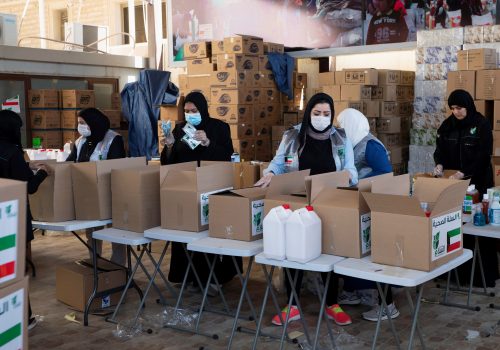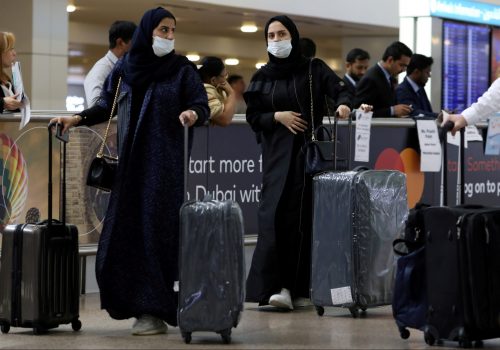Will Saudi Arabia’s private sector be able to hold up during a pandemic?
Like most parts of the world, Saudi Arabia is facing a serious challenge caused by the spread of COVID-19. As of May 4, the Saudi government has 27,011 confirmed coronavirus cases and 184 deaths. While the pandemic has impacted public health, politics, and the economy, it is the national labor market that is facing one of the most severe challenges.
Due to the lockdown and curfew implemented since March 25, most businesses in Saudi Arabia are either suspended or have reduced their activities. As a result, employees have become a heavy burden for companies, as most cannot afford to pay them wages while they stay home. Several companies announced the closure of their branches, entirely, including Taiba Investments, Saudi Airlines Catering, and Al-Andalus Property Company SJSC.
The Saudi government announced the consequences of coronavirus as a force majeure. And, on April 3, the government issued a royal decree allocating $2.4 billion to compensate Saudi citizens who work in the private sector in facilities affected by the pandemic. However, such bounteous support might only reduce the problem, not solve it.
As part of the royal decree, the Deputy Minister of Work Resources Abdullah N. Abuthnain disclosed three choices for Saudi employees in the private sector: exhaust the annual thirty leave days for employees, which also applies to employees with unused leave days; accept the alignment of remuneration with working hours under the current circumstances, which is less than regular work hours they used to perform; or take unpaid leave and receive governmental support which offers sixty percent of their salary. The final option is part of SANED, the Saudi insurance scheme against unemployment, which aims to motivate employers to keep their employees at zero cost.
This formal support should reduce the consequences of the pandemic on the Saudi private sector. However, some Saudi citizens may still be harmed by the impact of the coronavirus on the economy. Under the royal decree, instead of terminating the contract of the Saudi worker, the employer has the right to apply for social security support—a monthly compensation payment that covers sixty percent of the employee’s wages for three months, up to a maximum of $2,400. However, employers might choose to fire employees, as it is unclear when business will get back to normal.
Essentially, the Saudi government is currently, only, supporting citizens working in the private sector. As for those who are working for the government, they will keep full salaries while they are either working from home—if it is deemed necessary—or on paid leave. Clearly, the government is the employer of those who work for the public sector. Thus, the government acts not merely as a government, but also as the employer who takes responsibility for its employees who are facing the force majeure. Additionally, the social security system in Saudi Arabia is divided into two systems: the public pension for those working for the government and the General Organization for Social Insurance for those working in the private sector. Each system has its own rules of savings and benefits. Consequently, the actions of the government are different based on its role as governor or employer.
It is worth noting that the support covers more than just salaries. On April 23, the acting Minister of Economy and Planning Mohammed Al-Jadaan announced a package of measures and initiatives worth more than $18.6 billion. The economic measures includes the expedition of governmental payment to the private sector within less than thirty days and the exemption of the private sector from some of the dues to the government (i.e. taxes and fees). Such an amount exceeds $13 billion. Al-Jadaan stated that the Saudi government added an additional fund of $3.7 billion to provide further support to the private sector. The fund offers liquidity to several sectors and covers wages of those working in passenger transport.
With that in mind, the question is how long this generous support from the Saudi government will continue. Oil prices are still lower than what the Saudis need to support Vision 2030, which is expected to have a budget of no less than $54 billion. Oil prices are currently affected because of the decline in demand due to the pandemic and the oil war with Russia, which ended on April 12, after OPEC agreed to an output cut of 9.7 million barrels per day.
It is worth mentioning that analysts expect oil prices to remain below $40 for the foreseeable future, while the national budget balance requires $80-85 a barrel. The future of the oil market is getting worse, since the June contracts collapsed by more than 45 percent. On April 21, the Saudi Cabinet expressed its intentions to take further joint measures with OPEC and other producers in regard to the stability of the oil market. This oil war is urging the Saudi government to limit or, even, cancel its excess spending and yet, the government chooses to increase public spending to support its citizens and residences.
On the one hand, the Saudi government is spending a significant portion of its cash reserves to save its citizens from a severe financial crisis. On the other hand, the government is gaining more popularity among Saudi citizens who receive support, which is beyond their expectations. Ironically, the coronavirus might serve as a vehicle of legitimacy for the absolute monarchy that takes responsibility for its citizens as democracies are struggling to help their own.
Abdullah F. Alrebh is an assistant professor of sociology at Grand Valley State University. Follow him on Twitter: @AbdullahAlrebh.
Image: Women shop at a shopping mall after the Saudi government eased a curfew and allowed stores to open, following the outbreak of the coronavirus disease (COVID-19), in Riyadh, Saudi Arabia May 2, 2020. REUTERS/Ahmed Yosri


